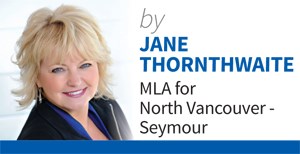One of the biggest issues that I have heard about from my constituents, both in my office and at the doorstep, is the current situation in the housing market. Many fear that their kids will be unable to afford to stay on the North Shore, a reality I face myself with my three children.
The legislature was recalled for the week of July 25 to help address this issue. The provincial government passed legislation that creates new measures to help make home ownership more affordable, establishes a fund for market housing and rental initiatives, strengthens consumer protection, and gives the City of Vancouver the tools it requested to increase rental property supply.
Here’s a breakdown of the legislation:
1. An additional property transfer tax rate of 15% will apply to purchasers of residential real estate who are foreign nationals or foreign-controlled corporations. The additional tax took effect August 2, 2016, and will apply to foreign entities registering their purchase of residential property in Metro Vancouver.
For mixed-use property, the additional tax applies on the residential component of the foreign interest in a property. For example, the additional tax on the purchase of a home valued at $2 million will amount to $300,000.
2. Second, the government is creating a new housing priority initiatives fund for provincial housing and rental programs, which will be announced in the near future. The fund will receive an initial investment of $75 million. It will receive a portion of revenues from the property transfer tax, including revenues from the new additional tax on foreign buyers.
3. Third, the province is amending the real estate services act to substantially implement the key recommendations of the independent advisory group report, and to end self-regulation of the real estate industry. The government has accepted all the recommendations in the report. These changes will increase significantly the superintendent of real estate’s authority and oversight.
4. Fourth, amendments to the Vancouver charter provide the legislative authority for the city to implement and administer a tax on vacant homes. The City of Vancouver will design the framework of the vacancy tax, including details like the tax rate, when it will apply and any necessary exemptions. Other jurisdictions may apply in the future.
Going forward, the provincial government has pledged that six principles will apply to all upcoming policy decisions in the coming months. This commitment was made after extensive feedback from constituents in our community.
The principles include increasing housing supply; linking communities together with smart transit investments; supporting first-time home buyers; and more. Also, the provincial government has ended self-regulation by the real estate industry and closed loopholes that allowed shadow-flipping. These actions are in addition to what was included in budget 2016, when the province changed the property transfer tax to help the market respond to mounting demand for housing.



